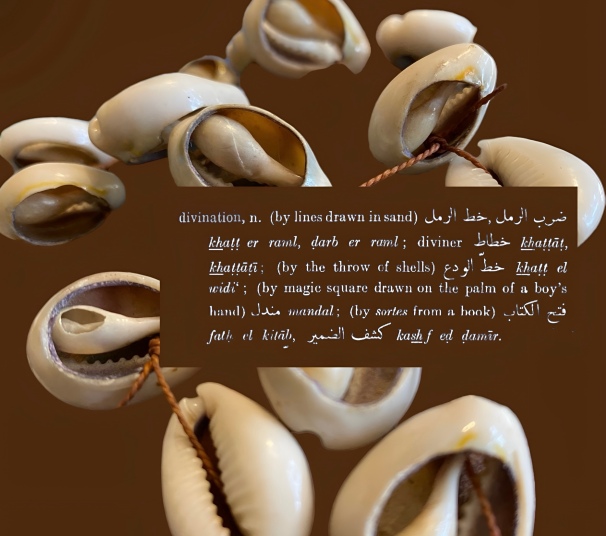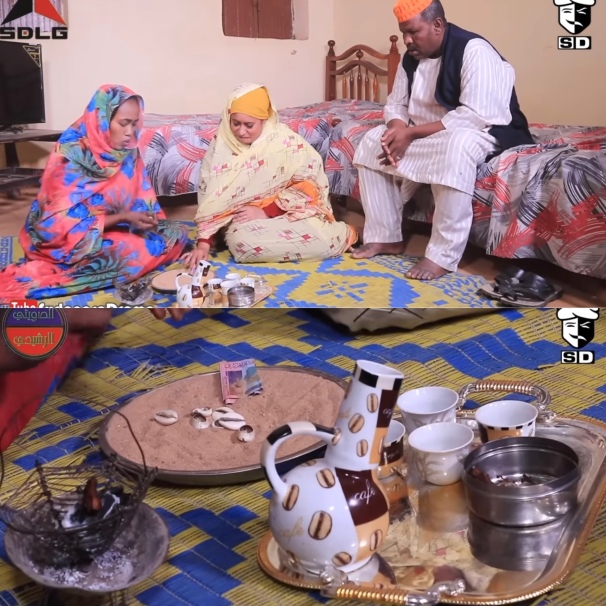Song; Sitt al-Wada`

Above, stills from the music video featured as this week’s text:طه سليمان Taha Suliman – ست الودع – اغاني و اغاني 2011
Background to This Week’s Text

Above, Sudanese Arabic terms related to divination, Sudan Notes and Records, Sudan Open Archive.
This week we study a very popular Sudanese love song, (Yaa) Sitt al-Wada`, Reader of the Cowrie Shells. This ancient form of fortune-telling stubbornly endures in Sudanese culture, inspiring numerous songs, sayings, verses and comedy sketches, as in the inimitable سِت الودِع | بطولة النجم عبد الله عبد السلام (فضيل) | , a scene from which is shown below.

Often conducted at home over coffee and accompanied by incense, khaTT al-wada` or divination by casting cowrie shells can be both therapeutic and entertaining in turbulent times.
if you would like to learn more about this fascinating folk practice before listening to the song, take a look at Cowries in Sudan . At the close of the article I provide a summary of the song, so avoid reading that end section before listening.
Possible Approaches
There are many versions of this famous song, all with slightly different lyrics. If you enjoy the song, you might like to compare it afterwards with other versions available on YouTube. What differences in lyrics do you notice? The version below is very loyal to the official lyrics, which are generally clearly enunciated. Any slight variations are mentioned in the annotations.
Although the syntax and much of the vocabulary is simple, the song includes many Sudanese colloquial expressions and cultural references you might not know and is wonderful glimpse into Sudanese folklore and marriage customs.
If, like me, you find it hard to understand Arabic song lyrics, then why not try first just to see how many different verses you can hear and which ones are repeated. As you listen to the repeated verses, can you understand a couple of lines of the verse? Can you catch any rhymes?
Focusing on the message of the song, do you feel it is happy or sad? What’s the story being told? A young man consults a reader of the cowries so what do you predict he might want to know? What does the fortune teller see in the way the cowries fall? How does the fortune teller address the young man?
Try to listen to the song several times before consulting the written lyrics below. Don’t forget you can slow down playback if needed.
If you feel you would like more written support to your listening, then, as you listen, put the jumbled verses below in the correct order.

Below a gap-fill exercise, if you enjoy this type of test. I have included two rhyming pairs of missing words.

Lexical Focus
What other words from the root w-d-` (cowrie) do you know? Which Sudanese onomatopoeia is used for rattle / jingle? The same root word is also used to describe the rattles worn by Nuba Mountains dancers. The song uses a Sudanese colloquial expression for “in front of me”. What might it be? Which Sudanese expression for “child” might you expect to hear? Which affectionate terms of address are used?
You will also hear words for “pale” to describe the shells, “luggage”, ”whisper”, “betroth / engage”, “forehead”, “embarrass”, “love”, ” be afraid” and “erase”. Can you predict what they might be?
The song refers to “fate / destiny” in two ways. Both ways are frequently used in Sudanese sayings. What could they be?
Watch the Song Here:
Song Lyrics

Annotated Lyrics

1 Reader of the Cowrie Shells, literally Lady of the Cowries, al-wada`; here you are, (referring to the shells); shake / rattle / throw the shells a little for me; below, Al Maany and Bab definitions with the w-d-` root;

2 kashkashii, inperative; from the verb kashkash, (kishkeesh), to jingle, rattle. This verb can also mean to become crazy, round up and lead away a herd, kishkeesh, to pleat, smock. kashkasha, noun, jingling or rattling, also decoration of dresses, sheets, curtains with embroidery and or tassels; kashkoosh, plural, kashaakiish; rattle, bells and rattle
3 maa takhtashii; don’t be afraid to tell me if, kaan, there is something in it; the singer asks the fortune teller not to hold back if she sees bad news for him in the way the shells fall
4 (and she shook the shells) in front of me; Sudanese colloquial expression; Hidaay
5 and she said “Oh my child”; jinaay; from janaa, plural, jinyaat / jannuun, baby, infant, young child
6 if only your fate / destiny; faal; also (good) omen, augury, presage, prediction by some occult means, were the fate of your enemy ( `aduuk) for (what I see here in the shells is)
7 big, here with the meaning of bad news and I haven’t added, zidtu anything to it. IN some versions you might hear kalaam gadiim
8 the two pale (ash-shaaHIbaat, also pallid / wan) cowrie shells (note the use of the dual case) have begun to prophecy;
9 Hamadu; a special term in divination by shells used to indicate the process of the shells revealing their prophecy;

10 what was whispered; from washwasha, to whisper came and said; note the verb “to whisper” also occurs in the first verse and chorus in this version of the song
11 yaa sayyid abuuh; the fortune teller uses an expression which is an affectionate address for the young man, oh my dear one
12 they betrothed (your lovely person); khaTaboo, referring to the zool jamiil, the young man’s beloved, grammatically masculine but referring to his lady love
13 to a young man of noble / highly respected line / of good manners / prestige; zool wad gabaa’il; literally son of the tribes. Note that in this version of the song, the singer adds the expression “wad muluuk” after these words; another expression of respect and praise
14 lamlim, collect / gather together your luggage, `izaalak; this refers to the shayla or dowry gifts traditionally offered by the groom; clothes, perfume etc that the young man has obviously already bought
and (added in this version go away, ziH ba`iid)
15 so that they (can’t) embarrass / humiliate you; yaHrijuuk); the Lady of the Cowries is telling the young man how to save face
16 here the Lady of the Cowries says that your mutual love; riidkum, the two of you still hold in your hearts; the young lady still loves him but
17 literally, what is written, that is pre-ordained / fated cannot be forgotten and is upon
18 (your) two foreheads and cannot be erased; meaning the young man must accept his fate.
